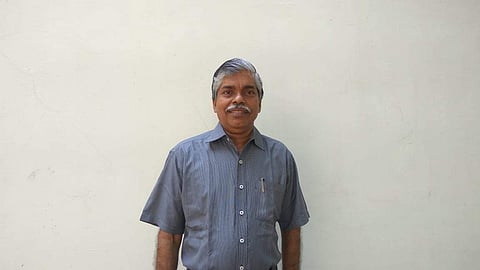

A newly discovered grass species in Rajasthan has been named after a Kerala scientist as a mark of honour for his contributions to forest ecology and plant biodiversity in India. Currently, working at the Institute of Forest Genetics and Tree Breeding (IFGTB), Coimbatore, C Kunhikannan (55) was ecstatic as we spoke to him over phone about this recent achievement.
Named Iseilema kunhikannanii, the grass species was found in the Bundi forest division in Rajasthan and it is said to be fodder for wild animals in the forest division. "This grass species is rare and was identified in 2018. As per the code of botanical nomenclature one has to give it a name, based on specific guidelines. It can be given in the honour of a person who has worked and is still working in the ecological field," says an elated Kunhikannan.
"It is the greatest honour that I could possibly ever receive for my work in the field," he added. He is thrilled that people are recognising his contribution in this field, and that, he says, is what matters. "This recognition will remain in science forever. I didn't know about this earlier. Forest Survey of India Deputy Ranger, Central Zone, Nagpur, K Chandramohan while submitting the manuscript, contacted me in May 2019 for consent to name the species after me. He and the other researchers also went ahead and published their discovery in the journal named Phytotaxa, which is a renowned publication across the world," the scientist said.
Kunhikannan, who was born in Kerala's Kasargod, presently heads the Committee for Rehabilitation and Reclamation Planning for iron ore mines in three districts of Karnataka. He explained that his current project aims to reclaim waste material from mines and restore it to a near-natural system. The IFGTB scientist has published nearly 44 papers including four books. He has worked in the research field for the past three decades, and has been with IFGTB for 19 years. "Initially, I was inspired by my father who was involved in agriculture back home in Kerala, I used to ask him a lot of questions about the fields, crops, and plants around us. My school teachers also saw that I had a knack for learning more about plants and biodiversity, so they helped me with books and asked me to read," says Kunhikannan, explaining how he got interested in biodiversity and the environment.
The 55-year-old scientist grew up in Kasargod amidst diverse flora that fuelled his interests as he grew. "Our house was near a field, a sacred grove and some hillocks. There is where I learnt a lot about the flora around me and in the region," he added. Kunhikannan studied Botany during his graduation days and then too his teachers helped him learn more about plants. "I used to collect random plants and take it to them and then they would tell me their names and explain how they grow. I read numerous books on medicinal plants and their classification. I am still learning while working on my every day projects," he says.
Settled in Coimbatore now, he also conducted a study titled "Survey and Documentation of Photo Diversity In and Around Singanallur Lake" in collaboration with the Centre for Urban Biodiversity Conservation and Education (CUBE) and Coimbatore City Municipal Corporation (CCMC). The study documented the presence of 453 plant species at the Singanallur lake and of them 328 were medicinal plants.
Currently, he is working on an All India Coordinated project on long-term monitoring of education for climate change research, involving several institutions all across the country and it comes under the aegis of the Indian Council of Forestry Research and Education. Kunhikannan said he has conduced a study on natural regeneration at Kerala's Silent Valley and a species recovery research on present species of medicinal plants in the Medicinal Plants Conservation Area in Silent Valley and Kolli Hills in Namakkal.
Chandramohan, the officer who initiated the naming of the species, told The New Indian Express that he wanted to name the grass after an ecological expert who has contributed a lot to the study of ecology. Hence, Kunhikannan's name was used after getting his consent. "Dr P Subramanyam, Regional Director of Central Zone-Nagpur had also suggested my name as he had heard about my work and contributions from my former colleagues in Nagpur. I used to work at the Jabalpur Tropical Forest Research Institute earlier," says Kunhikannan.
"If we follow the idea of naming new flora species after an Indian scientist's name, it would encourage them to do more research," added Chandramohan. He said that the grass was identified in Rajasthan in September 2018. "Earlier, there were only seven grass species across India that come under Iseilema genes. Now, the grass discovered in Rajasthan is the eighth species found in our country. The research was conducted simultaneously to study the features of the grass species."
